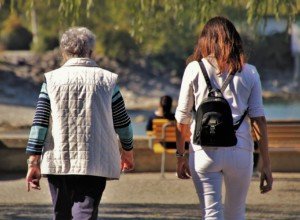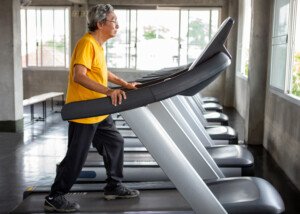
Slow walkers may seem more relaxed, but this habit is hazardous to one’s health.
Habitual slow walking, regardless of reason, is bad for your health.
This doesn’t mean that if you decide to move slowly while walking your new puppy or while sightseeing, that something bad will happen to your body.
What it means is that habitually walking slowly, concurrently with no cardio exercise to offset this bad habit, can shorten lifespan.
This conclusion comes from University of Pittsburgh researchers who analyzed nine studies involving about 35,000 participants 65 years or older.
For each increase in speed of gait of one meter per second, came a correlating 12 percent reduction in risk of death.
Translation: Faster walkers live longer.
Subjects who walked slower than 1.36 mph had an increased risk of mortality.
Those who walked faster than 2.25 mph lived longer.
This is scary news for elderly people as well as younger people who habitually walk slowly.
It’s easy to blame slow walking on advanced age.
But look around you: You’ll see 20-somethings moving like turtles – everywhere.
Watch crowds of people crossing a street. Most are not senior citizens, yet the crowd crawls, whether there’s five people, 10, 15 or 30.
Even pairs of people lethargically move. How often do you observe even a solitary person briskly walking across a street? It’s a rare sight, even if they’re wearing sneakers.
You’ll find slow walkers all over shopping parking lots – ranging from 20-something to 50-something. This slow walking continues into their senior years.
How well can you walk 400 meters?
In study subjects 70-79, those who couldn’t walk one-fourth a mile were less likely to still be around six years later, and more likely to suffer disease and disability prior to death (Journal of the American Medical Association, 2006).
Another study showed that men 71-93 who could walk two miles a day had 50 percent the risk of heart attack of men who could only cover one quarter mile or less.
Maybe it’s too late for your great grandma to put some spring in her step, but how did she get this way in the first place?
Lack of structured cardio exercise is sure in her history.
It’s not far fetched to expect the next generation of “old elderly” to be able to walk with a perk, being that more and more people in their 70s and 80s are completing long-distance walking and running events!
I’ve been on backcountry hikes exceeding five miles with people over age 70.
So certainly, the sooner you make fast walking a habit, even if it’s just going from your car to the store entrance, the more you’ll lengthen lifespan.
How to Become a Fast Walker

Shutterstock/sirtravelalot
Simply make the decision to. However, as a former personal trainer, I recommend the following:
- Make sure your shoes are comfortable. Wear walking footwear as much as possible in public.
- Swing your arms more when you walk.
- At least once a week, spend a little time on a treadmill at a walking pace that’s faster than what you’re used to. Walk this pace for 10-15 minutes at a level incline. DO NOT HOLD ONTO THE TREADMILL.








































